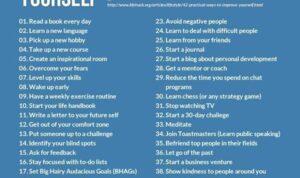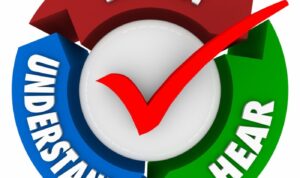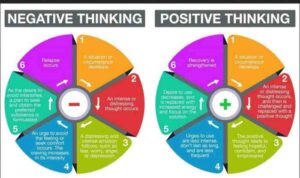Effective Communication Skills takes center stage in this guide, inviting you into a world of communication finesse that can transform your personal and professional relationships. Get ready to dive into the key elements that make communication truly impactful.
From active listening to understanding nonverbal cues, this discussion will equip you with the tools to enhance your communication skills and navigate any conversation with confidence.
Importance of Effective Communication Skills
Effective communication skills are essential in both personal and professional settings. In personal relationships, good communication helps build trust, strengthen bonds, and resolve conflicts. In the workplace, effective communication leads to increased productivity, better teamwork, and overall success.
Enhancing Relationships
Effective communication skills can enhance relationships by fostering understanding, empathy, and respect. When individuals communicate clearly and openly, they are better able to express their thoughts and emotions, listen actively to others, and work towards common goals. This leads to stronger connections, healthier interactions, and more fulfilling relationships.
Boosting Productivity
In professional settings, effective communication skills are crucial for boosting productivity. Clear and concise communication helps clarify expectations, assign tasks efficiently, and provide feedback constructively. When team members communicate effectively, they can collaborate seamlessly, make informed decisions, and achieve goals effectively, leading to increased productivity and success.
Impact of Poor Communication
On the other hand, poor communication can lead to misunderstandings, conflicts, and inefficiencies. Miscommunication often results in confusion, frustration, and mistakes, which can damage relationships, derail projects, and hinder progress. When individuals fail to communicate effectively, it can lead to mistrust, resentment, and missed opportunities, ultimately impacting both personal and professional outcomes negatively.
Elements of Effective Communication: Effective Communication Skills
Effective communication involves various key elements that contribute to successful interactions. These elements include active listening, clarity, nonverbal cues, and empathy. Let’s explore how each of these elements plays a crucial role in effective communication.
Active Listening
Active listening is a fundamental element of effective communication that involves fully concentrating, understanding, responding, and remembering what is being said. By actively listening to the speaker, you show respect and interest in their message. For example, nodding your head, maintaining eye contact, and paraphrasing what the speaker said are all ways to demonstrate active listening.
Clarity
Clarity in communication ensures that the message is easily understood by the receiver. It involves using simple and concise language, avoiding jargon or complex terms that may lead to confusion. Providing clear instructions, asking clarifying questions, and summarizing key points help enhance clarity in communication.
Nonverbal Cues
Nonverbal cues such as facial expressions, body language, gestures, and tone of voice play a significant role in conveying emotions and intentions. These cues can either reinforce or contradict the verbal message being communicated. For instance, a smile can indicate friendliness and openness, while crossed arms may signal defensiveness or disagreement.
Empathy
Empathy is the ability to understand and share the feelings of another person. By showing empathy in communication, you demonstrate that you care about the other person’s perspective and emotions. Empathetic responses, such as acknowledging the other person’s feelings, can help build trust and strengthen relationships.
Verbal vs. Nonverbal Communication
Both verbal and nonverbal communication are essential in conveying messages accurately. While verbal communication involves words spoken or written to convey information, nonverbal communication includes body language, facial expressions, and tone of voice. Verbal communication provides explicit details, while nonverbal cues offer additional context and emotional cues. A combination of both forms of communication is crucial for effective and comprehensive message delivery.
Developing Effective Communication Skills
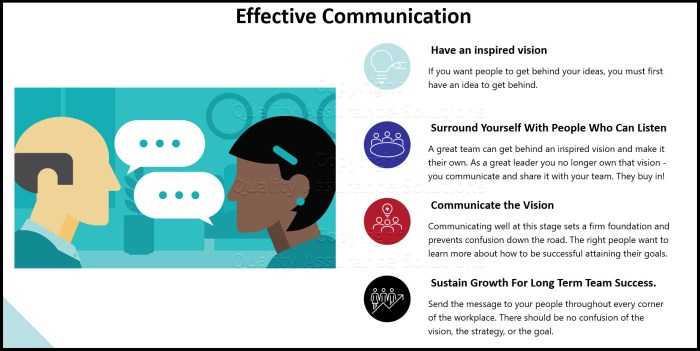
Effective communication skills can be honed through practice and dedication. By focusing on specific areas like active listening, clarity in communication, and empathy, individuals can improve their ability to connect with others and convey their thoughts and ideas effectively.
Strategies for Improving Active Listening Skills
Active listening is a crucial component of effective communication. To enhance active listening skills, individuals can:
- Focus on the speaker without distractions.
- Ask clarifying questions to ensure understanding.
- Paraphrase and summarize the speaker’s points to demonstrate attentiveness.
- Maintain eye contact and use nonverbal cues to show engagement.
Share Tips for Enhancing Clarity in Communication to Avoid Misunderstandings
Clear communication is essential to avoid misunderstandings. To enhance clarity, individuals can:
- Use simple and concise language to convey messages.
- Provide context and background information when necessary.
- Avoid jargon and technical terms that may confuse the listener.
- Confirm understanding by asking for feedback or clarifying questions.
Discuss the Role of Empathy in Effective Communication and Ways to Cultivate It
Empathy plays a significant role in effective communication by allowing individuals to understand and connect with others on an emotional level. To cultivate empathy, individuals can:
- Practice active listening and show genuine interest in others’ perspectives.
- Put oneself in the other person’s shoes to understand their feelings and experiences.
- Show empathy through verbal and nonverbal cues like nodding, mirroring expressions, and offering support.
- Practice empathy in everyday interactions to build stronger relationships and improve communication skills.
Effective Communication in Different Contexts
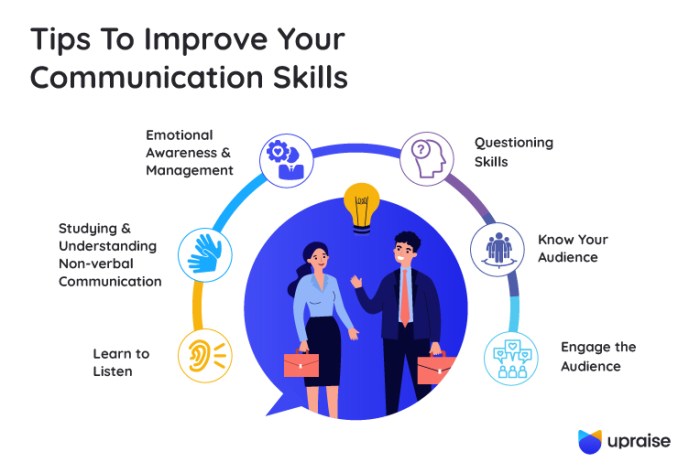
Effective communication varies depending on the context in which it takes place. This includes personal relationships and professional environments, as well as communication across different cultures. Adapting communication strategies is crucial for effectively reaching diverse audiences.
Personal Relationships vs. Professional Environments
In personal relationships, communication tends to be more casual, emotional, and based on personal experiences. This can involve using informal language, sharing feelings openly, and building trust through empathy and active listening. On the other hand, in professional environments, communication is typically more formal, structured, and focused on achieving specific goals. This may involve using professional language, being concise and direct, and prioritizing clarity and professionalism.
Cultural Differences in Communication Styles
Communication styles can vary significantly based on cultural differences. For example, some cultures value direct communication and assertiveness, while others prioritize indirect communication and harmony. Understanding and respecting these cultural differences is essential for effective cross-cultural communication. For instance, in some cultures, silence may be valued as a sign of respect, while in others, it may be interpreted as a lack of engagement.
Adapting Communication Strategies for Diverse Audiences, Effective Communication Skills
Adapting communication strategies is key to effectively reaching diverse audiences. This involves considering factors such as language barriers, cultural norms, and individual preferences. For instance, using simple language and visual aids can help overcome language barriers, while being mindful of cultural differences can prevent misunderstandings. By adapting communication strategies to the specific needs and preferences of diverse audiences, individuals can ensure their message is effectively received and understood.







